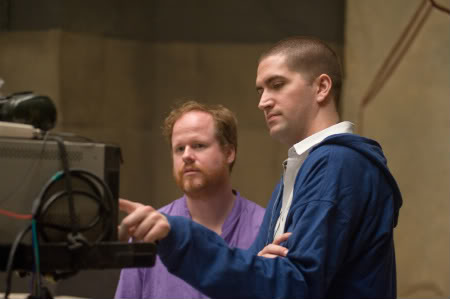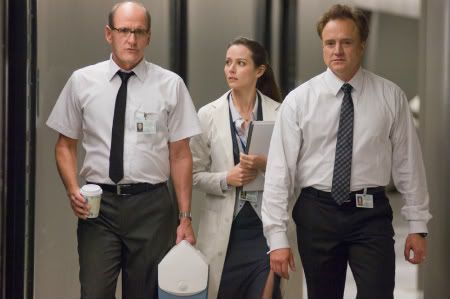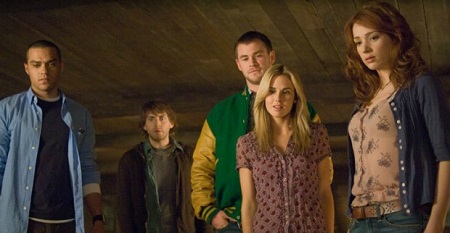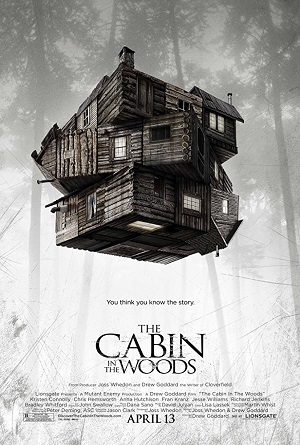
“The Cabin in the Woods” – Interview with Drew Goddard and Amy Acker
by Sara Michelle Fetters - April 12th, 2012 - Interviews
Truth is Everything
Goddard and Acker Try Not to Reveal the Secrets of The Cabin in the Woods
The question presented when you interview The Cabin in the Woods director and co-writer Drew Goddard, and especially when you speak with actress Amy Acker, is how do you chat with them about the movie without ruining any of its secrets? It’s a tough nut to crack, and sitting in a room at the downtown Seattle Fairmont Olympic Hotel it was one we were all aware of.

PHOTO: Lionsgate
“It’s a great question,” laughs Goddard. “It’s one we’ve been faced with since the beginning. The tricky thing about Cabin is not like there’s any one twist. There’s a bunch of them. It’s much more about escalation than it is any one twist. It’s not a like a Sixth Sense sort of thing where you learn this one [truth] and it changes everything.
“But the less you know about the movie the more fun you are going to have. When talking about it, it’s finding that balance of how do you tell the audience it’s worth their time but also saying that, if you’re going to go, don’t learn anything beforehand. It’s hard to do that.”
Yet, much like Goddard readily admits, it isn’t like these twists and turns are kept hidden very long. He and co-writer Joss Whedon reveal much of their hand early, letting the audience in on what is going on in bits and pieces in order to let their story breathe and expand in a natural, character-driven way.
“That’s always how Mr. Whedon has done things,” states the filmmaker. “If you look at Buffy the Vampire Slayer, we’d always put what was supposed to be in the third act in the first act. We’d move the story up all the time as we were dealing with episodes, as we were fleshing out a season. That’s just his aesthetic. He doesn’t play coy with the audience. Let’s just start where other people finish and then see where that will take us.”
For an actress like Acker, someone who audiences fell desperately in love with in regards to her dual work as Fred and as the demonic Illyria in Angel, doing interviews for The Cabin in the Woods is a tricky proposition. A Joss Whedon regular (she appeared in Dollhouse and has a central role in the writer/director’s upcoming Shakespearean adaptation Much Ado About Nothing), while the secrets involving her character aren’t hidden for very long, to reveal them before seeing the movie could spoil the fun. Even so, the knowledge that Acker was playing a character so integral to the internal machinations of the plot mechanics wasn’t lost on her, either. More than that, these were aspects of the role she enthusiastically embraced.
“That’s kind of the fun part, isn’t it?” Acker asks with a grin. “Even when I saw [the movie] I was like, oh, yeah, that’s how it starts. That’s the first scene. Then, for me, watching the whole thing it was such a revelation. You experience every emotion. You’re not just waiting for that one [twist] the whole time. You’re able to just dive right into it and go on this journey. Even having worked on Cabin, I was amazed just how much I felt for the main characters and what they were going through.”
Not that she could have said “no” to being a part of the film. That was never a decision she was going to be allowed to make. “Amy is pretty used to [Joss and I] calling her and saying you’re going to be in this,” jokes Goddard, “so no turning us down. We’re going to be sticking you in here whether you like it or not.
“Seriously, Amy’s great, and it was a pretty last-minute thing when she came onboard. But Joss and I have so much confidence in her talents and in abilities we knew she going to be able to pull the character off. As you said, it’s a fairly important role so we needed an actress to fill it we could count on to make her come alive in a way the audience could hopefully in some fashion relate to.”

PHOTO: Lionsgate
Jumping into the role was made all the easier when it was revealed whom she would be sharing the screen with, Academy Award-nominee Richard Jenkins and Emmy Award-winner Bradley Whitford. “After I watched the movie I was like, I’m so lucky,” Acker says winsomely. “People are going to think I’m good just because I’m near them!
“Working with [Richard and Bradley] was such a joy. They’re such professionals, and it was like they’d been bouncing lines off one another for an eternity. Just to share so many scenes with them, to be a part of that mix, that was something I wouldn’t have missed for the world.”
As for the script, the concept started out with the basic precept, ‘five friends go to a remote cabin in the woods,’ and then expanded from there. Goddard and Whedon wrote the first draft over a weekend, the two throwing in everything including the kitchen sink, letting their love for the horror genre permeate every sentence.
“It was a total blast to write,” he admits. “Joss and I made an entire weekend of it, and I was sometimes shocked as to what we were coming up with. And we didn’t do any research at all. This [the horror genre] is just something we love, and the script came from this place where we were writing about what we would want to watch and not worrying about whether or not someone would let us make it. There was something very freeing about that. The whole movie is really just Joss and I trying to entertain each other, that’s really what the writing process was like. But that’s how Buffy was. That’s how Angel was. That’s why I love working with him so much. It’s just so much fun to create.”
Yet, after jumping through so many hoops, after finally convincing a studio to put up the financing to get it made, after having the cast and crew come together and craft something Goddard couldn’t be more pleased about, the fact The Cabin in the Woods was sitting on the shelf for over two years thanks to MGM’s much-publicized bankruptcy had to have been at least somewhat deflating. “That sucked,” admits the director with a laugh. “I cannot lie. Having that happen didn’t exactly put a smile on my face.
“But it’s been interesting. In some ways it’s the best thing that could have happened. First of all, we weren’t the only people that got hit by this. When you see The Hobbit get delayed, when you see the latest James Bond movie get derailed, when you see heavyweights dropping like that you realize what’s going on is way above your pay grade, which is weirdly sort of calming because you realize you’ve just got to weather the storm.
“For me, that meant protecting the film. Whenever there is a change of management you’re never sure if the new boss is going to understand what it is you’re trying to do. Luckily, Lionsgate was wonderful. They didn’t want to change a frame. They wanted to put it out exactly as Joss and I imagined it. When that happened, I was like, okay, this is going to take longer than I wanted, but at least we’re going to be in the right home. Not only were we with the studio who released a number of the films from the past 15 years we were commenting on, some of our stars went on to become Gods of Thunder. So I think it worked out positively in the end.”
For Acker, a veteran of the Whedon/Goddard school of dialogue, returning to it with this film was like riding a bike. “I have no desire to improvise where it comes to Joss and Drew’s scripts,” she says proudly. “Their stuff is so much funnier and richer than anything I could ever dream of coming up with myself. Really, the only problem is when you don’t get scripts that are written by people like Joss and Drew. That’s when it hits you just how great their stuff is. You don’t realize how broad it is, how large the scope is, and then suddenly it smacks you across the face you’re working on a great big giant movie. That’s how intimate and personal they make it.”
“It’s weird and it’s true, but that’s how a lot of things we work on feel,” interjects Goddard. “It’s not that we’re making a big movie, it’s that we got the gang together and we’re putting on a show. That’s how it always feels, which is something that I like.”
Which is a feeling you can trace all the way back to Goddard’s time on Buffy, Angel, Alias and Lost, television shows with humongous scope yet minuscule budgets. The events being depicted always felt larger than life, the filmmaker being a part of these massive features (i.e. Cloverfield) and programs that didn’t necessarily have the money to realize everything they wanted to visually.
“Our TV training comes in huge,” he explains. “You just learn if you do it fast and you’re very prepared in what you’re going to need you can do just about anything. Excess gets features into a lot of trouble because you can do anything. But with TV, you don’t have a choice. You have eight days to get it done, so you better have a good plan. Those were the lessons we drew from when making Cloverfield. They were the lessons I drew from in regards to directing this.”
As for Cloverfield 2 or his recently delivered script for Robopocalypse to be directed by Steven Spielberg, don’t expect Goddard to be too forthcoming on either project. “I’m not sure what’s going on with Cloverfield 2,” he admits. “We all probably have our own ideas as to where we’d want to take things next, we just need to get in a room and talk about them. What we do know is we don’t want to do the same thing all over again. If that’s all it is, then there’s no reason to make a sequel.
“As for Robopocalypse, I’ve delivered the script and I’m happy with it. Other than that, I’m pretty much sworn to secrecy. I can’t say much more than that.”
As our time runs down, and the publicist is urging us to wrap things up, I mention how much The Cabin in the Woods reminded me of some of John Carpenter’s seminal works, how after watching it I immediately went home and had a The Thing, Prince of Darkness and In the Mouth of Madness triple-feature. This news brings a smile to the director’s face broader than anything I’d seen in all our brief 20 minutes together.

PHOTO: Lionsgate
“I love John Carpenter,” Goddard states matter-of-factly. “For my money there is nobody better ending movies than John. While I love everything he does, the one thing no one does better is end movies. Even his movies that are less successful have phenomenal endings. If our movie’s climax could be mentioned in the same breath as some of what he’s done, that would be a dream come true.”
“The movie kind of speaks for itself, doesn’t it?” adds Acker. “I took my husband to see it and he was like, ‘That was awesome!’ That seems to be the general reaction from a lot of people, and I hope more great things happen for Drew and for Joss so I can sneak into some of their other movies and be a part of all that enthusiasm.”
“This movie definitely spoiled me,” laughs Goddard. “Making it was such a joy. I don’t know what I’m going to do next that’s going to have as much an opportunity to do as much crazy stuff as this one did. But I love writing, I love directing, I love producing. I love it all. Whatever I do next, that attitude has definitely served me well so far, and I imagine it will continue to serve me well in the future.”




